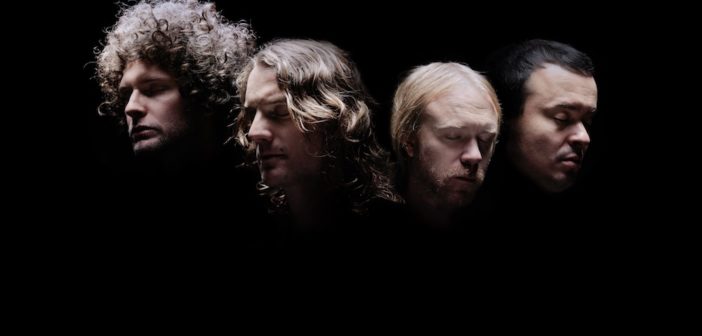Googling “Gustav Ejstes” brings up recordings of the Swedish musician’s work with Dungen and, more recently, Amason — with whom he’ll be performing in Australia later this year.
Dungen were part of a wave of bands on the airwaves of Triple J over a decade ago with a late ‘60s aesthetic, from their tape saturation to the plate reverb-drenched recordings. Wikipedia notes Ejstes appears on a Wolfmother DVD and elsewhere online are comparisons with Tame Impala. Like those bands, Dungen has broadened their sound but still seem to relish detours deeply into progressive rock.
There are elaborate musical passages that feature a wide variety of instrumentation and it amazed Jason Richardson when he spoke with Gustav Ejstes that Dungen’s material is entirely written and often largely recorded by one person.
Jason Richardson: I was surprised when I started researching Dungen to learn that you write all of the songs. When I listen to your music I hear so many instruments that I assume there are so many instrumentalists.
Gustav Ejstes: Yes, it’s true. I do all the songwriting.
Jason Richardson: Do you have a preferred instrument for composing?
Gustav Ejstes: I make up songs on the guitar and the piano. Piano mostly.
Jason Richardson: Do you write different sorts of songs with different instruments?
Gustav Ejstes: If you have certain boundaries, you’re lead to certain results. It’s good to have boundaries.
Jason Richardson: There are lots of ideas and changes in Dungen’s music. It’s quite intricate at times.
Gustav Ejstes: It’s not our aim to make it difficult. I try to make it develop. Stuff that evolves and keeps interesting.
There was this guy we had as a guest on a show recently. He was 71 but he’s still playing as he has been all his life. Everyone was enjoying the music and we said it’s great when culture connects. But he said to me ‘that’s not why you do it — you play for yourself’.
We try to keep it interesting because we write music for ourselves.
Jason Richardson: Is prog-rock the best way to describe Dungen?
Gustav Ejstes: Prog-rock is one truth but it’s not the whole truth. It’s one way to describe the sound.
Jason Richardson: There’s a definite ’60’s influence.
Gustav Ejstes: A lot those instruments sound the best. We haven’t improved on that craftmanship. The music of the 1960’s has been a great influence.
Jason Richardson: Do you record to tape?
Gustav Ejstes: We record to tape. The latest album was with my friend Mattias Glavå, who is very into analog.
Earlier Dungen records were recorded using my computer in my living room and it took a while. To get it to sound like I wanted took three days, while with Mattias Glavå it took three hours.
Jason Richardson: Do you still have a home studio?
Gustav Ejstes: I have a space, a rehearsal space. I’m on my way there now.
I work in a studio more recently. I found my soul mate in recording. We complement each other. He’s totally nerdy and satisfied too.
Jason Richardson: I’m sorry to labour the point but I’m still amazed at the songwriting in Dungen. Are you saying that the musicians you record with don’t shape their parts while rehearsing for an album?
Gustav Ejstes: It’s become a bit complicated over the years as we’ve developed into a full band. I’m picky and territorial. I might be hard to work with. Then the human hand comes in and we’re all individuals. If we play it too many times before we record we lose something.
Jason Richardson: Like what?
Gustav Ejstes: If I say to the musician to think of a cloud above a football field while they play, as they play it more times it becomes more defined than what they think of the cloud. The first take recording a song is almost always the best.
Jason Richardson: How does that work when you’re playing the songs live?
Gustav Ejstes: It’s frustrating to arrange an album into a live performance. All those overdubbed harmonies and flute parts need to move to other instruments.
Jason Richardson: In one interview I read you talked about treating songwriting as a job.
Gustav Ejstes: It’s my day job. You can’t look around for inspiration, you have to work at it.
Jason Richardson: I don’t understand a word of Swedish, so listening to your voice sing in Dungen songs means it’s like another instrument.
Gustav Ejstes: For me as a music listener, I enjoy hearing music that I understand. I put a lot of effort into my lyrics. I put a lot of myself into them too, it’s some kind of public diary. Sometimes people ask about the meaning of a song and I’ll tell them and it’s not usually what they expected.
Jason Richardson: That’s interesting that you explain the meaning to people. Many artists refuse to explain their works.
Gustav Ejstes: I’ve learned not to explain what the song is about. Now I turn their question around and ask them what they think the song is about. Otherwise they often seem to end up disappointed with my explanation.
Dungen Australian tour dates:
BRISBANE: Monday, December 5 @ The Zoo with Golden Age Of Ballooning.
SYDNEY: Wednesday December 7 @ Oxford Art Factory with The Laurels.
MELBOURNE: Thursday December 8 @ The Corner with ORB + Krakatau + Psychedelic Coven DJs.
MEREDITH: Friday December 9 @ Meredith Music Festival.
PERTH: Sunday December 11 @ Rosemount Hotel with special guests.
Dungen’s new album Häxan is out November 25 on Smalltown Supersound via Balance. The Record Store Day / Black Friday LP exclusive is limited to 2,000 copies on white vinyl and the CD edition, also limited to 2,000 copies, includes a 6-panel foldout wallet.




